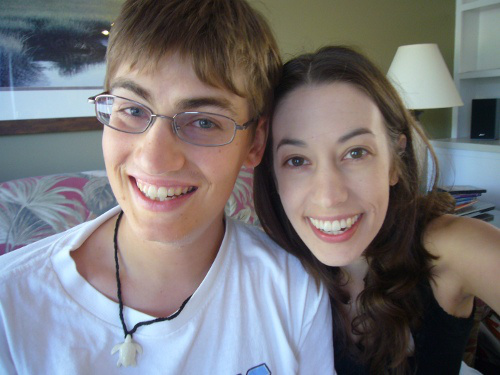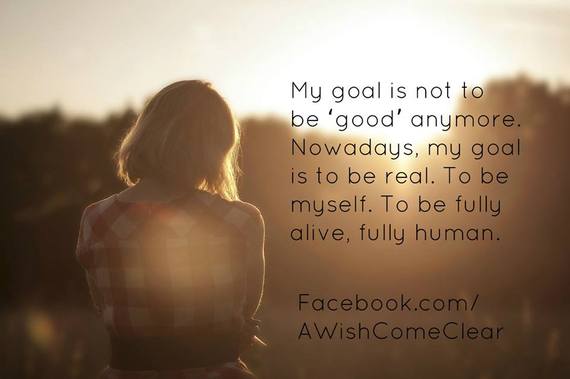You know what's difficult?
Standing up for yourself and your needs.
Questioning the 'should dictator' in your head.
Deciding not to let false guilt boss you around.
If you dare to do these things, then you're my hero. Seriously.
After all, I know what the resistance feels like. When I consider making positive changes on my own behalf, my judgmental inner voice likes to screech, "But isn't that SELFISH and BAD?!"
As women, we've been conditioned to be 'good' and put others first. Over time, it becomes unconscious, automatic. Then, when we secretly feel depleted and angry, we wonder what's wrong with us. Good girls don't get resentful ... right?
Wrong. If we're always being 'good' at the expense of our truths, our souls are going to get mad. But how can we give ourselves permission to have needs, to be human?
Here's a story for those of us who struggle with that question.
A few months ago, my parents and my younger brother Willie came to Alabama for a visit, and we had a wonderful time. After several days of group activities, though, I needed to recharge. I'm an introvert through and through, and I get twitchy if I don't take solo time.
Willie's birthday fell on the fourth day of the visit, and he wanted to see the latest Disney movie in theaters. Willie has autism, as well as a tremendous ability to focus. He'll watch his favorite films over and over, memorizing dialogue, singing, and typing up the end credits too.
As we made plans, I realized that I could drop my family off at the theater and take two hours for myself. That is, if I dared defy that internal accusation: "It's your brother's birthday! How can you be so SELFISH?!"
That question paralyzed me. I couldn't make a decision, so I pulled my husband Jonathan aside and asked, "Would not staying for the movie make me a terrible person?"
It may sound silly, but at the time, I was totally in earnest. An internal tug-of-war raged: Go! Don't go! Make your family happy! Take some time for yourself!
Jonathan encouraged me to come home and rest, but I could tell by his tone that he didn't think I'd actually do it. (I didn't blame him. He knew how hard it would be for me.)
On the drive to the theater, I was still torn. Wouldn't a 'good' sister and daughter go to the movie and sacrifice her need for restorative time?
Maybe so. But then I remembered: my goal is not to be 'good' anymore. Nowadays, my goal is to be real. To be myself. To be fully alive, fully human.
Mary Oliver said it best in her poem, "Wild Geese":
You do not have to be good.
You do not have to walk on your knees
For a hundred miles through the desert, repenting.
You only have to let the soft animal of your body
love what it loves.
With that in mind, I took a deep breath and told my family the truth: I needed to go home and rest. They were surprised, but not upset.
As I pulled away from the curb, though, I felt SO guilty. Tremendously, overwhelmingly guilty.
That feeling lasted for about a minute. (It was a long minute.) But then I felt ... free. I had two hours to be alone! I was practically dancing with relief.
***
In order to stop people-pleasing, you need to be willing to feel the false guilt that arises when you "let people down". And by "let people down", I mean, "not do every single thing that anyone asks of you".
As Henry Cloud and John Townsend write in Boundaries,
"... A sign that you're becoming a boundaried person is often a sense of self-condemnation .... When the struggler actually sets a limit ... the conscience moves into overdrive, as its unrealistic demands are being disobeyed .... In a funny way ... activating the hostile conscience is a sign of spiritual growth."
Make no mistake: this is emotional power-lifting. If you're like me, you've been dodging such uncomfortable feelings for decades. You've been doing whatever it takes to avoid the tidal wave of guilt that crashes over you when you risk honesty.
Here's what I've learned: when unnecessary self-blame floods your body, you can breathe through it. You are stronger than that feeling. It will not wash you away.
That day at the movie theater, the sense of self-recrimination was intense. Still, I kept driving. I decided to trust that the feeling would pass.
***
This is a humble story, I know. But it's the everyday moments that change us. It's the ordinary choice points that alter the course of our lives.
So today, I encourage you: when you meet your next choice point, take a moment.
Consider that what your mind labels "selfish" might be the kindest, wisest action you could take. And trust that all loving actions ripple outward, blessing the lives of those around you.
I understand how hard it is to step out of martyr mode. But you can start small: say no to just one request this week, then use the time to do something kind for yourself.
When you do, be prepared for an increased sense of hope. After all, if you can stand up to the bully in your head ...
***
This piece first appeared on A Wish Come Clear, a blog devoted to helping you choose love, lose fear, and find home. Visit and receive free copies of Caroline's three digital books, all designed to bring you back to what matters most.

